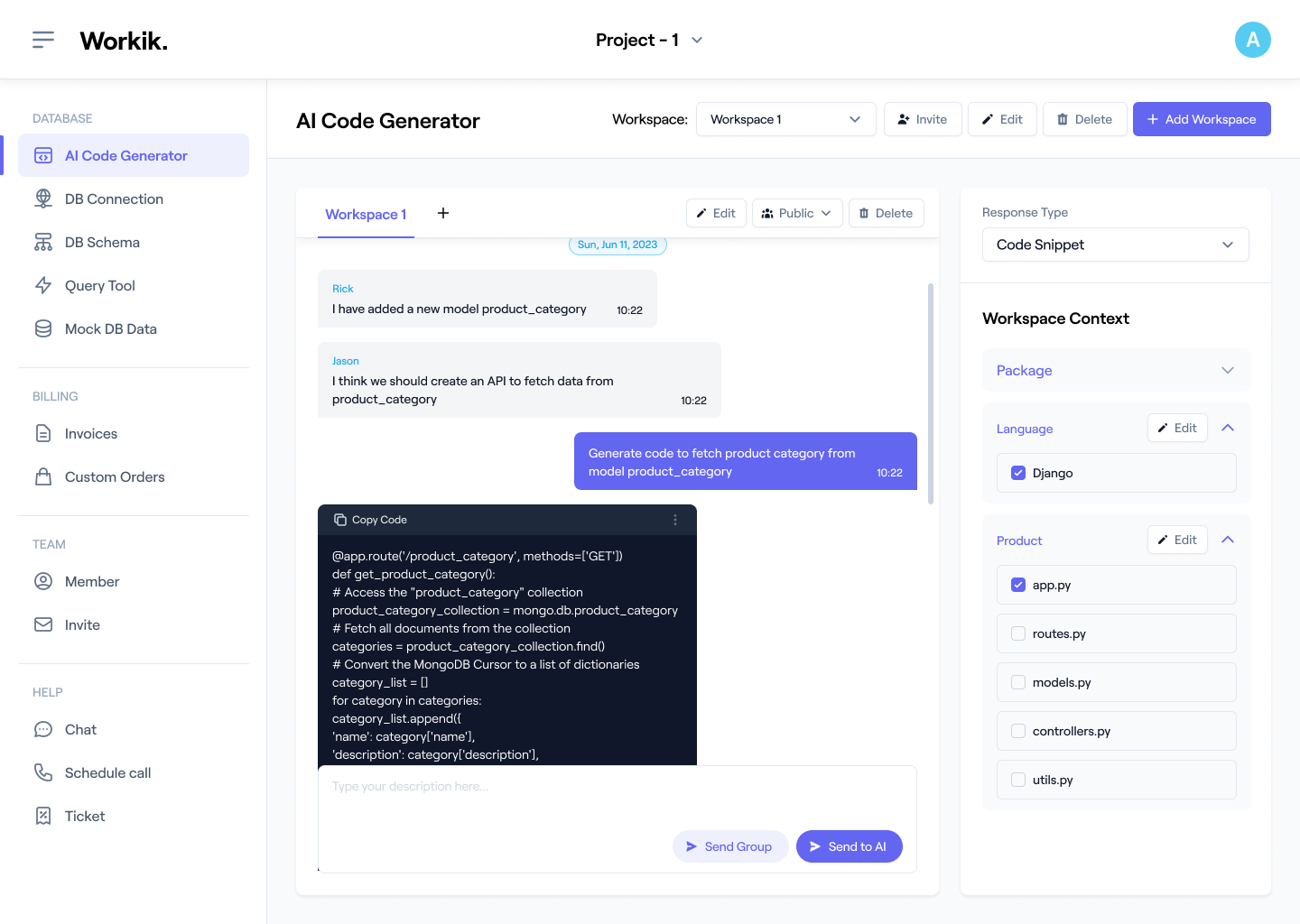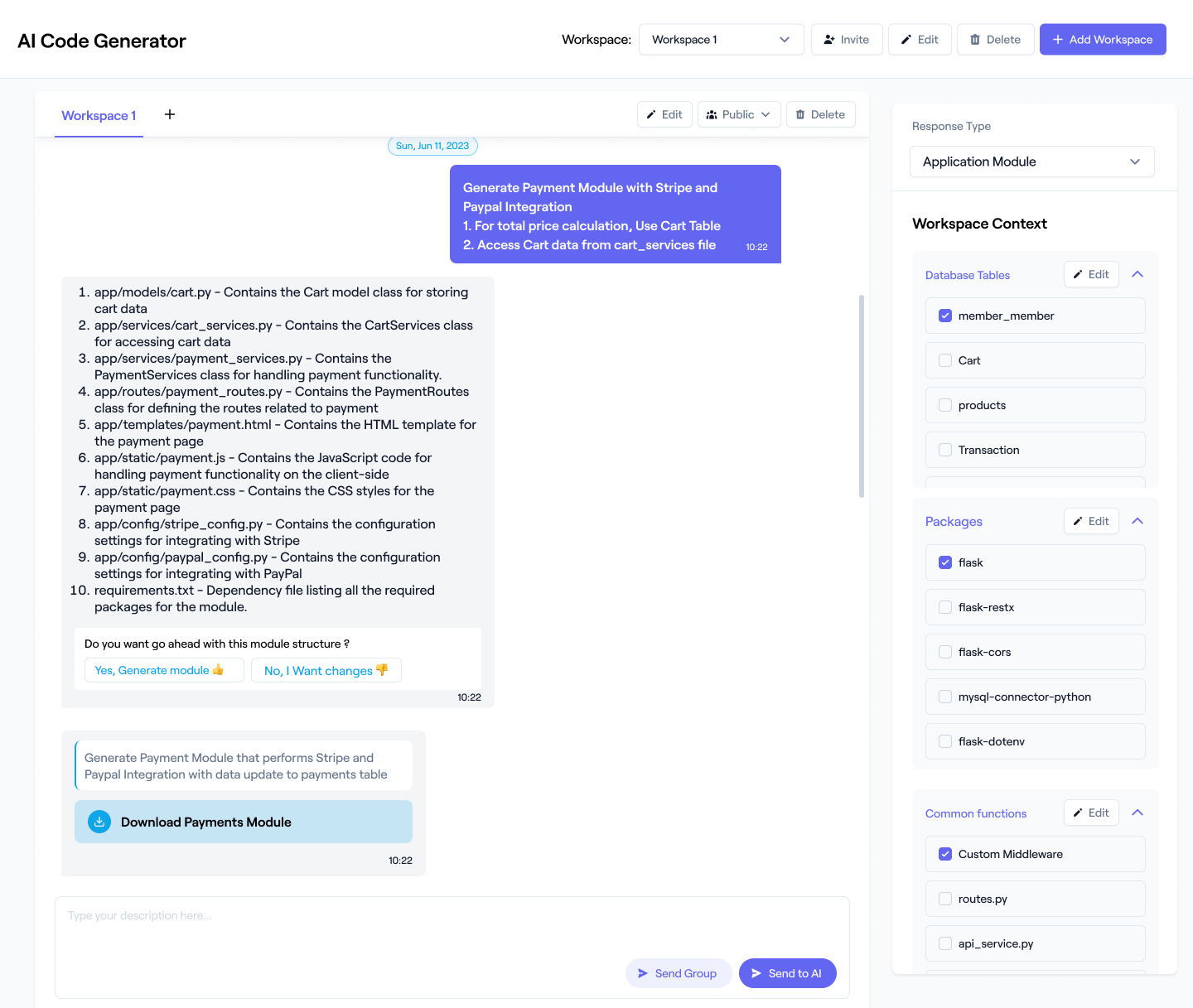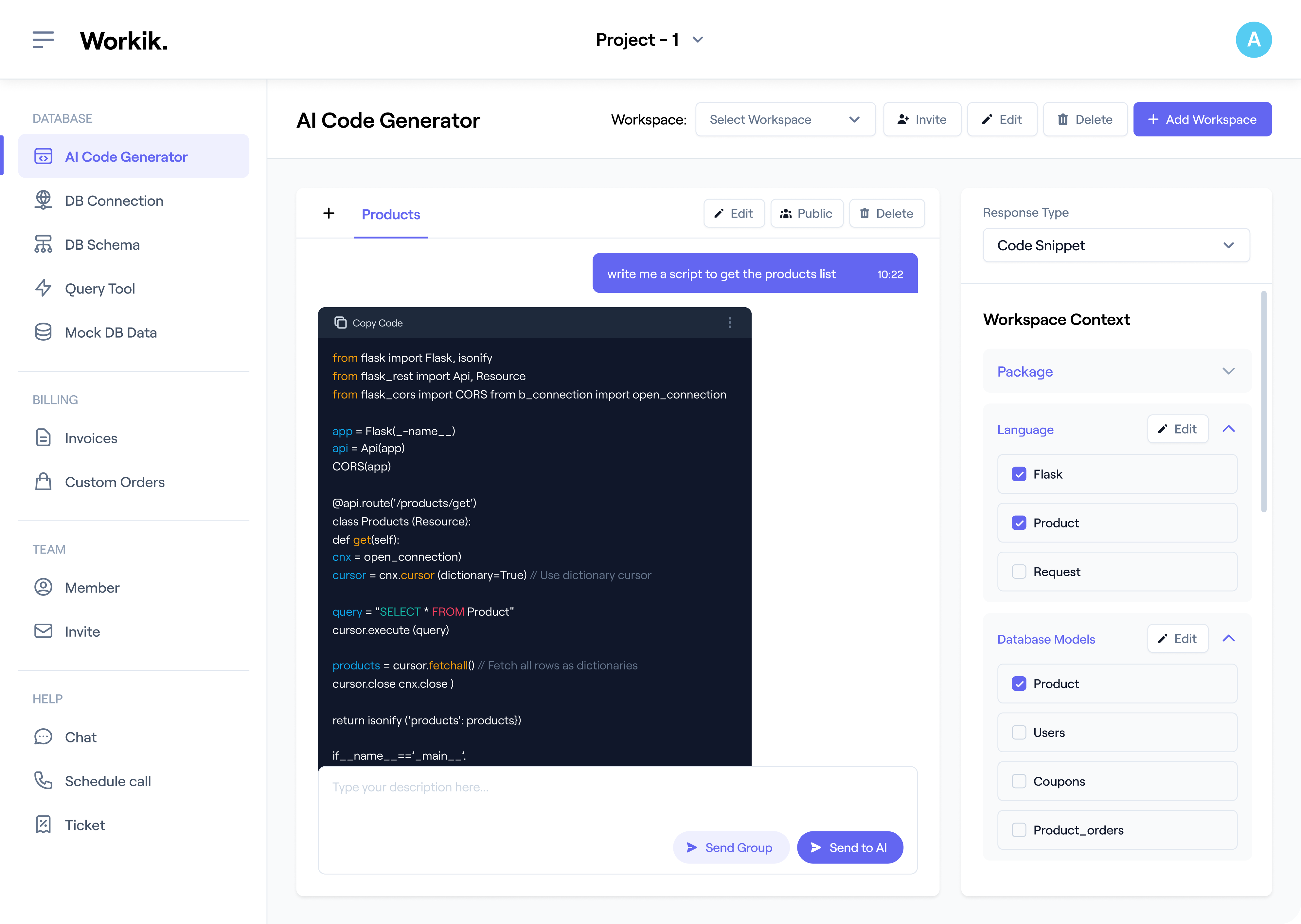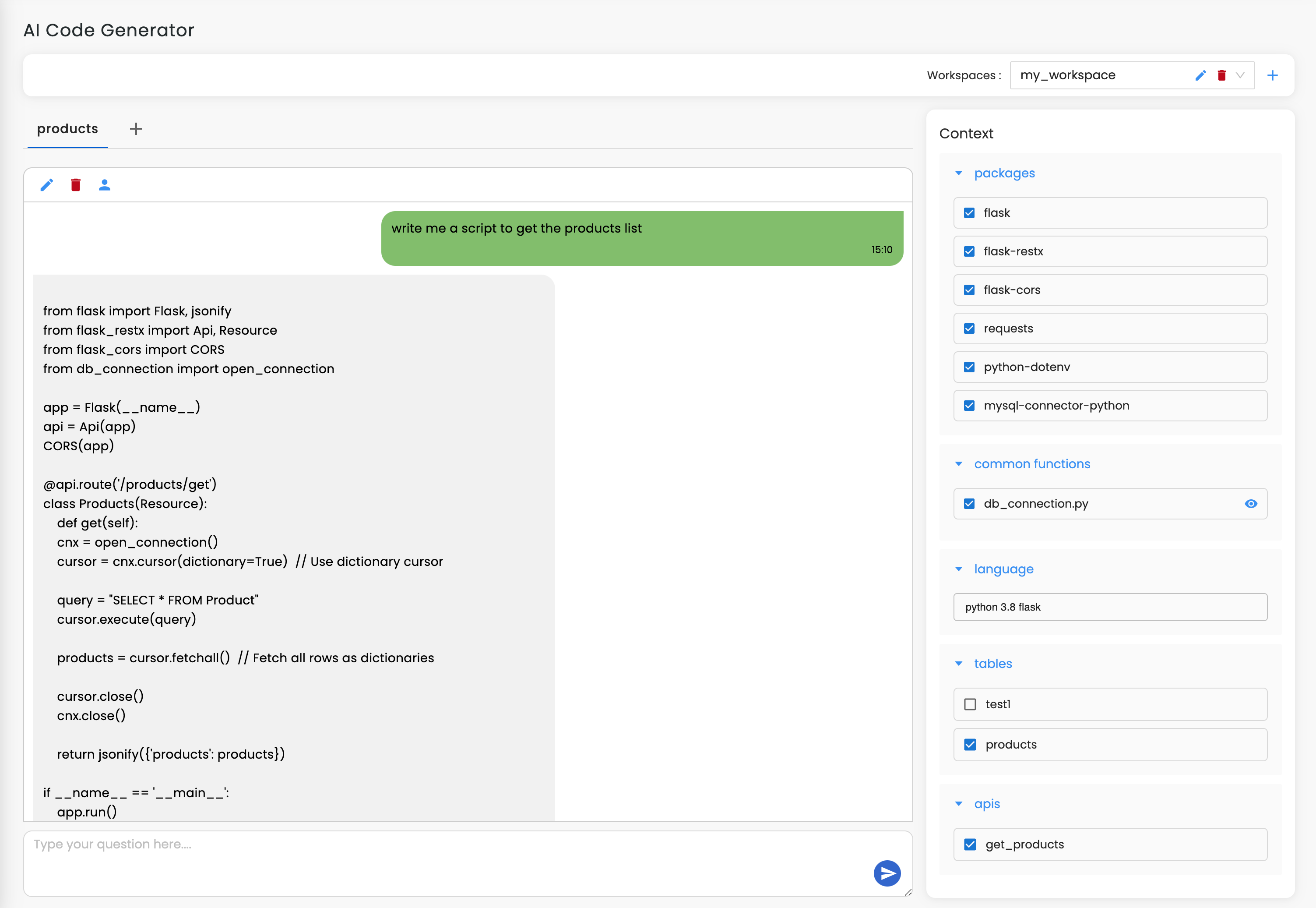
Join our community to see how developers are using Workik AI everyday.
Features

Simplify API Requests
AI instantly generates AFNetworking code, simplifying network requests, error handling, and data parsing for faster API integration.

Boost Async Efficiency
AI optimizes Grand Central Dispatch (GCD) setup for seamless concurrency, keeping background tasks smooth and apps responsive.

Effortless Testing
AI creates comprehensive XCTest cases, covering unit, UI, and performance testing to ensure robust app quality.

Generate Reusable UI Components
AI builds reusable UI components, like buttons and tables, saving time on repetitive interface tasks across iOS/macOS apps.
How it works
Sign up at Workik with your Google account or manually enter your details to get started.
Import Objective-C projects from GitHub, GitLab, or Bitbucket. Define models, controllers, and services. Specify frameworks like UIKit, Core Data, or AVFoundation for precise AI assistance.
Use AI to generate code for UI components, data management, and networking. Get tailored debugging suggestions, automate tests, and generate documentation, ensuring seamless development across the project.
Share AI-generated insights with your team in real-time, and deploy your app. Seamlessly handle platform-specific configurations for macOS, iOS, watchOS, and tvOS.


Expand


Expand


Expand


Expand


Expand


Expand


Expand


TESTIMONIALS
Real Stories, Real Results with Workik
Generated Objective C networking code that integrates perfectly with REST APIs. Huge time saver!

Isabelle Martine
Mobile App Developer
Workik AI built Objective C modules for my app's UI logic in minutes. Flawless code generation!

Ethan Hall
iOS Developer
Produced Objective C code for background services efficiently. Workik AI handled complex workflows perfectly.

Daniel Parker
Lead Mobile Developer
What are some popular use cases of Workik AI for Objective-C code generator?


Popular use cases of Workik AI for developers include, but are not limited to:
* Generate reusable UI components like buttons, tables, and custom views based on UIKit or AppKit.
* Help with memory management, ensuring correct use of ARC (Automatic Reference Counting) or manual retain/release.
* Create service classes for API interactions, including RESTful services and third-party SDK integrations.
* Generate Core Data models and boilerplate code for local persistence.
* Automate iOS app performance optimizations, such as reducing memory leaks and handling multi-threading (GCD).
* Set up testing frameworks like XCTest and OCMock, generating unit tests and integration tests automatically.
How does context-setting work in Workik for Objective-C development?


Workik allows users to add any of the following diverse contexts for Objective-C development. Users can:
* Link GitHub, GitLab, or Bitbucket repository to integrate your Objective-C codebase.
* Specify frameworks like Foundation, UIKit, or Core Data to guide AI in generating relevant code.
* Add Core Data or custom database schemas to auto-generate data models and CRUD operations.
* Include project-specific libraries or custom classes to ensure AI adheres to project's coding standards.
* Set up API blueprints to guide AI in generating HTTP request classes and JSON parsing for networking.
Can Workik AI handle Objective-C to Swift code conversion?


Yes, Workik AI generates Swift equivalents, handles bridging headers, and ensures compatibility with Swift-only APIs. It also leverages Swift features like optionals and closures to optimize the migration process.
How does Workik AI assist with Objective-C memory management (ARC vs. MRR)?


Workik AI helps optimize memory management by identifying where ARC (Automatic Reference Counting) can be used efficiently, while also flagging issues in manually retained/released (MRR) memory code. It detects potential memory leaks and ensures the correct use of retain and release patterns for effective memory handling.
How does Workik AI help with Objective-C networking and multithreading?


Workik AI simplifies networking by generating AFNetworking or NSURLSession code, including error handling and data parsing. It also optimizes multithreading tasks by setting up Grand Central Dispatch (GCD) for managing background tasks, ensuring smooth concurrency and responsive applications.
Does Workik AI support Objective-C code documentation?


Yes, Workik AI can generate documentation for Objective-C projects, covering method descriptions, class diagrams, and dynamic features like message forwarding and method swizzling. This documentation can be updated as the project evolves, ensuring clarity across the team.
How does Workik AI assist with performance profiling and debugging for Objective-C apps?


Workik AI integrates with performance tools like XCTest and Instruments to automate the detection of bottlenecks in memory usage, CPU performance, and responsiveness. It helps identify inefficiencies in multi-threading (GCD) and memory management, ensuring a seamless user experience by automating testing and debugging tasks.
Can Workik AI assist with iOS/macOS app deployment and continuous integration (CI)?


Absolutely. Workik AI helps with deployment tasks, including configuring Xcode builds, managing provisioning profiles, and automating the CI/CD pipeline. It integrates with Jenkins, CircleCI, and GitLab CI to automate testing and deployment notifications.
Generate Code For Free

Objective C: Question and Answer
Objective-C is a general-purpose, object-oriented programming language primarily used for macOS and iOS development. It adds Smalltalk-style messaging to the C programming language and was the main language used by Apple before the introduction of Swift. It remains widely used in legacy projects and in cases where developers need to interact with older macOS and iOS frameworks. Objective-C’s strong integration with the Cocoa and Cocoa Touch frameworks makes it a key player in Apple’s ecosystem.
Popular frameworks and libraries used in Objective-C development include:
UI Frameworks:
UIKit, AppKit (for macOS)
Networking:
AFNetworking, NSURLSession
Data Persistence:
Core Data, Realm
Animations:
Core Animation, UIKit Dynamics
Third-Party Libraries:
Firebase, Facebook SDK, SDWebImage
Testing:
XCTest, OCMock
Concurrency:
Grand Central Dispatch (GCD), NSOperationQueue
Cross-Platform Tools:
CocoaPods, Carthage
Popular use cases of Objective-C include:
iOS and macOS App Development:
Build native applications for iPhone, iPad, and macOS.
Legacy App Maintenance:
Maintain and update older apps written in Objective-C.
Hybrid Projects:
Integrate with Swift in hybrid iOS/macOS projects for smoother migration.
Performance-Critical Applications:
Develop apps requiring fine-tuned memory management and performance optimization, especially for AR, VR, or gaming.
Enterprise and Banking Apps:
Build highly secure apps where manual memory management and low-level control are crucial.
Career opportunities and technical roles available for Objective-C professionals include iOS Developer, macOS Developer, Mobile App Developer, Full-Stack Developer (iOS/macOS), Software Engineer, and Legacy System Developer. Developers with Objective-C expertise are often sought for maintaining and updating legacy apps or migrating them to Swift.
Workik AI provides extensive Objective-C development support, including:
1. Code Generation:
Automates the generation of Objective-C code for UI components, networking, and Core Data models.
2. Debugging:
Identifies memory leaks and runtime issues specific to Objective-C’s manual memory management.
3. Migration Assistance:
Helps in migrating Objective-C codebases to Swift with automated code suggestions and Swift equivalents.
4. Optimization:
Suggests performance improvements in multithreading (GCD) and memory management (ARC).
5. Dynamic Features:
Assists in managing complex dynamic features like method swizzling and message forwarding.
6. Unit Testing:
Automates the generation of unit and integration tests using XCTest and OCMock.
7. API Integration:
Guides the integration of REST APIs using NSURLSession or third-party networking libraries like AFNetworking.
8. Deployment:
Simplifies the app deployment process for TestFlight and App Store, including CI/CD pipeline setup with Jenkins, CircleCI, and GitLab.
Explore more on Workik
Get in touch
Don't miss any updates of our product.
© Workik Inc. 2026 All rights reserved.

